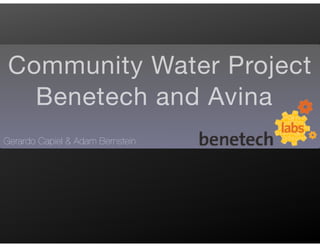Benetech:avina labs project
- 1. Community Water Project Benetech and Avina Gerardo Capiel & Adam Bernstein
- 2. Impact Background !2 - 1 billion globally lack access to safe drinking water - 2 billion globally lack access to sanitation facilities - Poor sanitation and water supply and resulting illnesses are the leading cause of death in children under 5 years old - Connection between water, sanitation, hygiene, and disease are a key focus of Millennium Development Goals - Water systems face long term sustainability threats from climate change, urbanization, over-extraction !
- 3. !3 Avina Background Background: Avina Americas is leading an effort to strengthen the organizational capacity and sustainability of community based organizations involved in the provision of potable water and sewage treatment services. Water Boards (OCSAS) 80K People Served 40M Current E?orts: - Focus on OCSAS that serve communities between 50-2,000 families - Diagnostic training program across 6 Latin America Countries - Costa Rica, Honduras, Nicaragua, Argentina, Peru, Ecuador - Diagnostic and educational modules in 10 parts
- 4. !4 Modules: The Diagnostic - 140 questions on 8 different categories - Organization, Administration, Operation & Maintenance, Sanitation System, Sanitation Education, Water Resource Management, Communication Areas for Improvement - Too many questions - No personalization/ localization based on region or OCSA - Rigid and oversimpli?ed, point based system - No data analysis, manual diagnostic stays on paper - Diagnostic doesnˇŻt inform subsequent modules ! !
- 5. !5 User Needs Diagnostic Related Other - Digital diagnostic tool that helps gather data for analysis - Shorter more accessible diagnostic and education tools - Personalized education based on region and needs of OCSAS - Necessity to prove e?ectiveness of initiatives to Federal Government for funding - Social network to connect OCSAS and help them share best practices - Water meter data collection and billing platform ! !
- 6. !6 WhatˇŻs out there? Survey Diagnostics - SIGAP in Ecuador - Android tablets to collect data on OCSA infrastructure - Water for People: AKVO FLOW - open source water data collection tool - Paci?c Institute: mWASH SMS - SMS tool for information intervention and ?ow - Community Choices: simple survey and advice tool - Paraguay Tablet Project - used tablets to collect data, stopped because of change of administration - Huduma - SMS platform as a channel for citizens to give feedback Capacity Building Tools - Avina Modules - paper based modules and certi?cate programs - WASH Institute - capacity building tools guides, and videos - SSWM - Sustainable Sanitation and Water Management Toolbox -workshops and certi?cate programs - AKVOPEDIA - web-based resource for water and sanitation education - and many more....
- 7. Our Proposal: The Diagnostic !7 Pilot project in Costa Rica - diagnostic survey for organization capacity using Android devices - collection, analysis, and mapping of data - key partners: Paula Burt (Avina), Lil Soto (Avina), and Ismael Martinez (UNAGUAS in Costa Rica)
- 8. Goals of Project !8 - use the power of data to help inform Avina as well as the government about the challenges and current capacity of OCSAS - develop using agile methods to gather more needs from users and better design the diagnostic - make diagnostic highly accessible and usable to get as much data as possible - transparency of data to all stakeholders - take our ?rst step toward understanding our users - foster trust from our partners and users ! ! !
- 9. !9 Data Input Android Tablet/Phone ODK Collect http://opendatakit.org/use/collect/ Web Browser formhub https://formhub.org
- 20. Extras - Map !20
- 21. Future Direction: Capacity Building How can we leverage digital tools to advance education and capacity building and improve access to existing resources? ! - Aggregate resources and help Avina create an educational platform built off of modules to help broaden the impact of their efforts - Partner with existing organizations who are running educational programs - Localization based on requirements of each participant country - Add rewards to completion of program, possible incentive structure for infrastructure improvements - Integrate with social network, to help spread best practices and network OCSAS !21





















